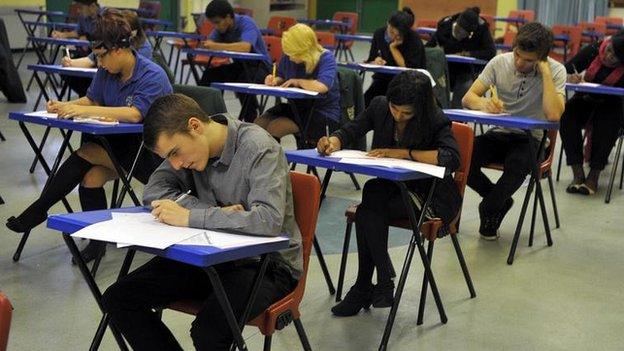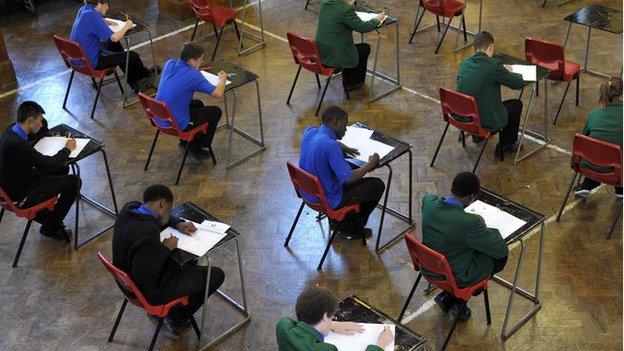Exam marking appeals to be overhauled, says watchdog
- Published

There were more than 400,000 appeals against results last year
The exam regulator says there will be "significant improvements" to the process of appealing against GCSE and A-level results.
Ofqual chief Glenys Stacey told the Commons Education Select Committee that proposals for a better system would be announced later this month.
Last year the number of appeals against grades soared to more than 400,000.
Exam boards charge fees for re-marking. One of them, AQA, received £4.7m last year from schools and parents.
Evidence revealed by the OCR exam board suggests that independent schools were disproportionately likely to challenge exam results.
'Strategic' appeals
There were more than 77,000 grades changed last year as a result of schools and parents paying for papers to be re-marked.
Ms Stacey told MPs that some schools sent back large numbers for re-marking "come what may".
Such a "strategic" use of the appeals process "doesn't seem particularly fair", she told the select committee.
There was a recognition that there was a problem with the current system, said Ms Stacey, and she promised there would be plans to make substantial improvements to create a process that was "swift, effective and fair".
The current system has a wide range of fees for re-marking, with fee levels and the numbers seeking re-marks suggesting the system cost schools and parents more than £10m last year.
Exam boards can set their own fees, with the fee waived if a grade is changed.
Edexcel charges £23 for a non-priority GCSE re-mark, while OCR charges £42.50.
"What we charge is designed to cover our costs and no more than that," said an OCR spokesperson.

How one state secondary school experienced this summer's exam re-marking:
75 appeals against results
21 appeals resulted in a higher grade
All changes were upwards and by one grade, such as B to A
Cost was about £3,500 with £800 waived for changed grades
School had 'key upgrades' in performance table, individual pupils 'clearly benefit'

But head teachers' leader Brian Lightman says that the cost has worked against some state schools, which have not been able to afford to get second opinions for so many of their students.
"Clearly many independent schools can afford to submit large numbers of re-marks whereas some state schools will struggle financially. Parents often pay for them," said Mr Lightman, leader of the ASCL head teachers' union.
Ms Stacey was asked by MPs about the reliability of exam grades and said that technology was increasingly being used that could monitor the quality of marking.
Substantial changes in grades on appeal were more likely to be the result of administrative errors, rather than "rogue markers", she told MPs.
But she said there were "probity checks" to ensure that markers were being sufficiently rigorous.
As an example, Ms Stacey said if a marker kept giving the same marks to every question while Coronation Street was on television, the monitoring technology would detect this pattern and raise a concern.
- Published6 October 2015

- Published14 October 2015